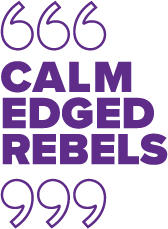What’s new for 2022? What should we be aware of and how do we prepare? Who do we turn to for guidance? And, as the government suggests closing another challenging year with advice to work from home (again), what’s coming our way as we settle into new ways of working?
So many questions. All against the backdrop of this sporadic recovery from the global pandemic, the aftermath of Brexit, and the impact of both on the economy which will be felt for some time to come. This is the great unknown.
In the final episode of season four for the Calm Edged Rebels’ podcast, Advita, Jenni and Trudy share what they believe are the trends to watch as we stand on the edge of 2022.
Change: Change will continue to be a big feature in the future. With it comes the hope that It will be handled better – as change always creates uncertainty and fear.There’s already a sense of ‘what now?’ and ‘how do we get ourselves future fit?’ Whatever form change takes, communicating with integrity remains key for It to work.
Open for business: In contrast to traditional leadership behaviour, today’s managers appear more open to hearing about ‘new’ management theories and, to ensure organisations survive, embracing emerging ways of working. Listening to understand will result in us seeing a kinder, more human, workplace.
Upskilling: No matter who you are in an organisation, we’re starting to look inward and examine ourselves more closely than we have in the past, acknowledging where we need to invest in personal development. There’s more openness to such conversations, especially investment in leadership behavioural skills
Hybrid working: Mixed working – part office/part home-based – has always been around. However, it will be the defining long-term cultural debate of the pandemic revolution. The hope is that it moves from discussions about location to being connected – and not just via technology.
ESG: Environment, sustainability and governance will move centre stage. But how will it manifest itself in terms of organisational culture, behaviours and values? This natural evolution of CSR (Corporate Social Responsibility) is prompted by the emergence of a new managerial generation responsible for sanctioning investment in businesses and industries where ESG is taken seriously. As investors, with staggering sums at stake, they expect to be informed on robust and consistent ESG compliant actions.
DIEB: Diversity, inclusion, equality and belonging will move further into the limelight. Much of this has been around for years. Quite rightly, increasingly more accountability has been placed on organisations. Some have made great advancements. However, employee expectations will continue to grow around leaders observing what they do, both personally and as an organisation, to contribute to this – to the level of zero tolerance. It will become part of everyday business as usual, and not a stand-alone project. One thing’s certain: as it evolves DIEB will remain wide-ranging, multifaceted and thought-provoking.
Gen Z: Digital natives born around the year 2000 are entering the workforce. They simply will not entertain organisations that don’t display certain expected behaviours, or keep pace with and adopt new technology. How can organisations ensure they embrace these hopes and beliefs to attract and retain this fresh talent?
Technology: We all need to get to grips with this. In fact, most of us already have. But how will technology continue to evolve and what role will it play? The big question is, with the ever-increasing speed of technological advancements, where do you go to find trusted sources for the right training? Start with a sector’s main body, institution or local college, as well as turn to your communities as a source of inspiration and recommendation.
Digital transformation: For years, many organisations have wrestled with what their digital strategy would look like or were reluctant to articulate what it should be. But we’re now at the point where if your organisation hasn’t looked at this then, to a certain extent, you may already be too late.
Upstarts: The rapid growth of new start-up businesses, because of or despite the pandemic, will continue its upward trend. To prosper, they too need to adopt the ESG/DIEB mantles and make them resonate with their employees and customers alike.
More mature manpower: With an aging population, willing and able to prolong working, the age range of the workforce is widening. And will continue to spread as the populace remains fitter and lives longer than before. How do we all work together, using this mix of skills and vast collection of experience? The growing, age-diverse labour force means we need to be mindful that it’s a bigger community to embrace, find ways to work well together and appreciate the differences in attitudes.
Wellbeing: This holistic approach to security, health and safety has expanded to incorporate numerous behavioral sciences, women’s safety and – the big post-pandemic aftereffect – mental health. Expect to see talk turn to defining the boundaries between organisational duty and personal responsibility.
Employee experience: There’s been a gentle shift away from the customer journey towards delivering an experience during the lifecycle of a person’s tenure with an organisation. This includes ESG, DIEB and wellbeing. Do we have the skills, knowledge and flexibility needed to incorporate any issues hiding on the horizon while ensuring a fulfilling relationship between employer and employee?
Personalisation: What does this mean for me? With so much personlisation outside of work, the audience won’t accept one-size-fits-all activities for much longer. As communicators, how do we avoid broadcast performances? What does this mean to the population that we serve? We need to offer a bespoke, to-the-right-people-at-the-right-time approach.
With intent: ESG, DIEB, tech training, being open, etc – all hinge on being intentional. One thing’s for sure, the trends are not necessarily brand new. It’s expectations that have changed which means there must be more intention behind them. People won’t tolerate situations that they tolerated before. And society says that you can no longer ignore such situations.
Most new trends were already happening due to societal revolution. The only factors that are different are the impact of the pandemic and Brexit on the employment landscape: what work will look like, the jobs available, the pay for those roles, the skills gaps, the training required, and connectivity.
Discover how we can help your organisation and leadership team work through these or any other challenging changes, drop us a line here hello@calmedgedrebels.com






